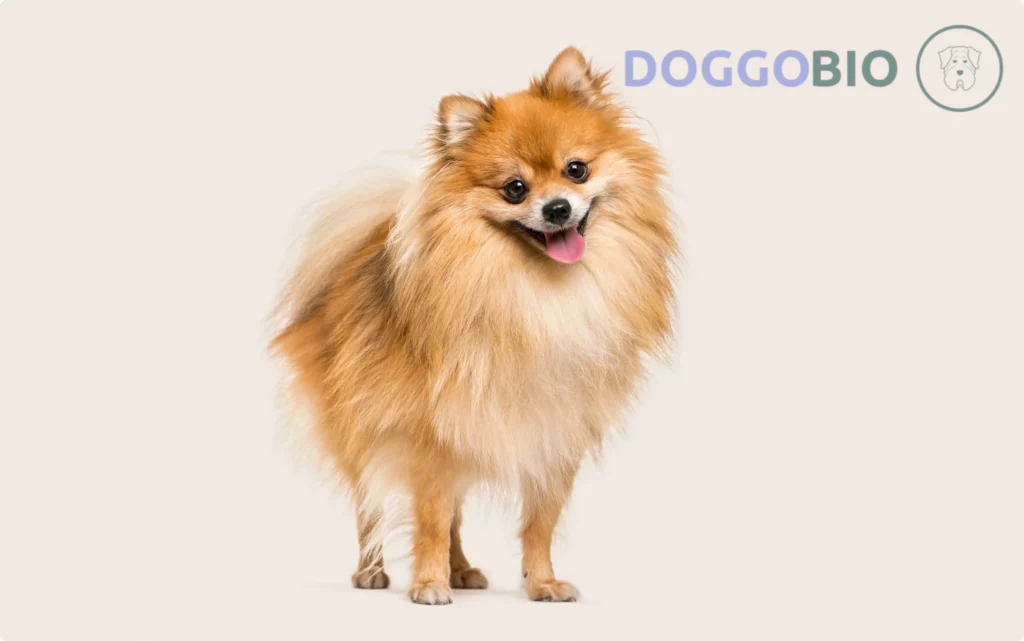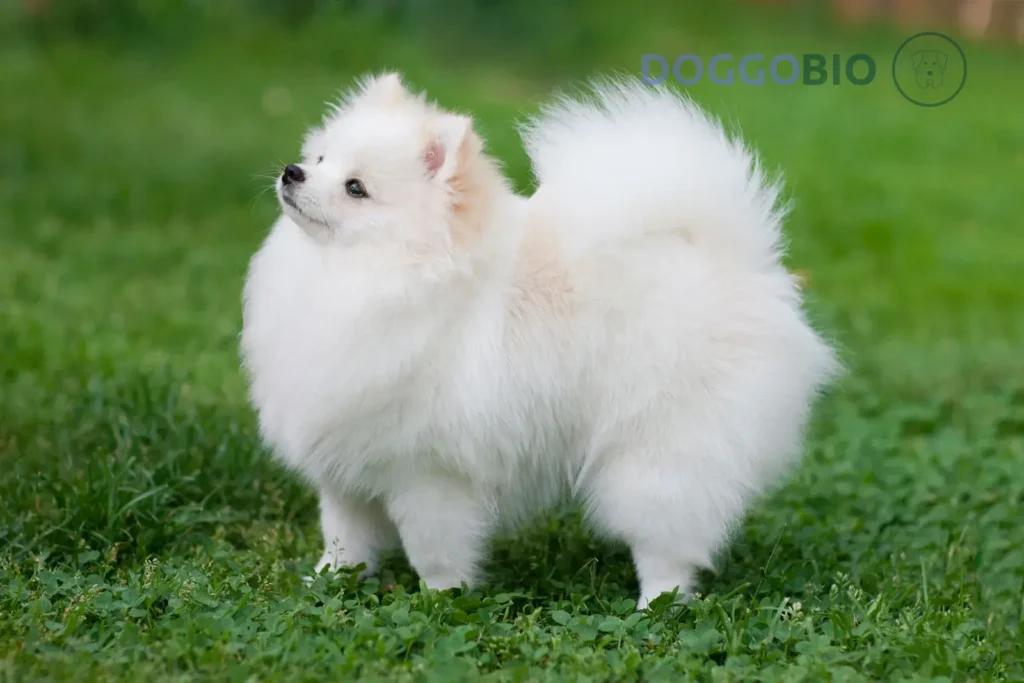Many potential pet owners prioritize finding hypoallergenic breeds when choosing a furry companion, especially if their family members suffer from allergies. The Pomeranian, with its fluffy coat and endearing appearance, often comes up in discussions about hypoallergenic dogs. But “Are Pomeranians Hypoallergenic?”
Yes and no. This seemingly straightforward question often sparks debate among dog lovers and allergy sufferers alike. While Pomeranians are indeed adorable and fluffy companions, claiming them to be completely hypoallergenic might be a stretch.
This article delves into the characteristics of the Pomeranian breed, the nature of pet allergies, and whether or not Pomeranians can be considered hypoallergenic. Understanding the implications for dog health, we explore how Pomeranians fare in relation to allergies, shedding light on their compatibility with allergy-prone individuals. Whether you’re an allergy sufferer or just curious about dog health, read on to discover more about these adorable canines and their hypoallergenic potential.
Are Pomeranians Hypoallergenic?

No, Pomeranians are not hypoallergenic.
The term “hypoallergenic” often leads to questions about whether Pomeranians fall into this category with their distinctive double coats and lively personalities. It’s important to clarify that no dog breed can be considered 100% hypoallergenic. Hypoallergenic breeds are those that produce fewer allergens, making them more compatible with individuals who have allergies.
Pomeranians, while charming and delightful companions possess a double coat that sheds regularly. This shedding process releases dander into the environment, a common allergen that can trigger allergic reactions. While some individuals with milder allergies might find certain hypoallergenic breeds more manageable, it’s essential for anyone considering a Pomeranian to be aware of their shedding tendencies and potential impact on allergies.
Individual reactions to allergens can vary significantly. Spending time with a Pomeranian before deciding is crucial to gauge personal sensitivity and determine whether the breed’s shedding aligns with your health needs. By taking this step, you can make an informed choice and ensure a harmonious relationship between you and your potential furry companion.
What does “hypoallergenic” mean?
Derived from the Greek word “hypo,” meaning “below” or “less than normal,” the term “hypoallergenic” in the context of products or animals refers to items less likely to cause an allergic reaction.
However, it’s crucial to note that hypoallergenic doesn’t mean allergy-proof. In the dog world, a hypoallergenic breed is less likely to cause allergic reactions in sensitive individuals.
But remember, individual reactions can vary, and what’s hypoallergenic for one person might not be for another. It’s always a good idea to consult an allergist to understand one’s sensitivities.
What are hypoallergenic dogs?

Hypoallergenic dogs are breeds believed to produce fewer allergens than other dogs. These breeds typically have hair instead of fur, shed less, and produce less dander.
Some popular hypoallergenic breeds include the Poodle, Bichon Frise, and Maltese. However, it’s essential to understand that while these breeds might be better for allergy sufferers, no dog is entirely allergen-free.
Factors like individual genetics, dog’s health, and grooming habits can influence allergen production. It’s also worth noting that personal reactions can vary, making it essential to spend time with the breed before deciding.
What makes a dog hypoallergenic?
Several factors contribute to a dog’s hypoallergenic status.
- Firstly, the coat type plays a significant role. Dogs with hair, like humans, shed less, reducing the amount of dander in the environment.
- Secondly, the amount of anger a dog produces can influence allergic reactions. Dander, tiny flakes of skin, carries proteins that can cause allergies.
- Lastly, a dog’s saliva, urine, and sweat can also contain proteins that trigger allergies. Hypoallergenic dogs typically produce fewer of these proteins.
It’s also worth noting that individual reactions can vary, making it essential to spend time with the breed before deciding.
Can I Build Up an Immunity to Dog Allergies?
Yes, some individuals can develop immunity to dog allergies over time.
This tolerance varies from person to person and involves controlled exposure to the allergen. However, consulting an allergist is crucial before assuming immunity. It’s also important to note that reactions differ among individuals, making it essential to spend time with the breed, like Pomeranians, before deciding.
Do Pomeranians Shed A Lot?

Yes, Pomeranians do shed. Pomeranians, known for their stunning double coats, experience shedding. Their undercoat, in particular, sheds at least twice a year, while the longer guard hairs shed continually. Although they might not shed in large clumps, as seen in some larger breeds, their small size and dense fur can still lead to noticeable shedding.
Regular grooming practices, including brushing and maintaining their coat, can effectively manage and decrease the loose hair they leave around the house.
Steps to keep allergies under control:

Welcoming a Pomeranian into your home can be a joyful experience, but it’s important to consider potential allergens, especially if you or someone in your household has allergies. Here are some comprehensive steps to keep allergies under control:
1. Meet your dog Before Adoption
Spending time with a Pomeranian before bringing them home can help you assess allergic reactions. This interaction allows you to understand better how your body responds to the dog and make an informed decision.
2. Regular grooming
Commit to regular grooming practices, such as baths and brushing. Regular baths can minimize dander and hair in your living environment. Brushing helps remove loose fur and reduces shedding, which can contribute to allergen accumulation.
3. Nutrious and Diet
A balanced and nutritious diet promotes a healthy coat and skin for your Pomeranian. A healthy coat is less likely to shed excessively, reducing the spread of allergens.
4. Exercise
Regular exercise contributes to your Pomeranian’s overall health and well-being. A healthy dog is less likely to produce excessive dander, which can trigger allergies.
5. Vet check-ups
Routine visits to the veterinarian are essential to monitor your Pomeranian’s health. Promptly addressing potential health issues can help prevent conditions that increase allergen production.
6. Use air filters and vacuum often
Invest in high-quality air filters to reduce airborne allergens. Frequent vacuuming with a HEPA filter-equipped vacuum cleaner can remove dander and fur from your living spaces.
7. Keep Your Dog Out of Your Bed
Designate specific areas, like your bedroom, as pet-free zones. This helps reduce direct contact, especially during sleep, which can significantly contribute to managing allergies.
8. Wash hands after handling
After interacting with your Pomeranian, make it a habit to wash your hands thoroughly. This simple hygiene practice can help minimize the spread of allergens to other areas of your home.
Grooming Requirements
Grooming is essential to caring for your Pomeranian’s well-being and ensuring they lead a healthy and comfortable life. Here are some essential grooming requirements to keep in mind:
1. Brushing
Pomeranians possess a lush double coat that demands regular brushing. This helps prevent matting and tangling of their fur, promotes healthy circulation, and distributes natural oils, enhancing the coat’s luster.
Aim to brush their fur a few times a week, and during shedding seasons, more frequent brushing can keep loose hair under control.
2. Dental Care
Dental health is crucial for overall well-being, and daily teeth brushing is recommended. This helps prevent plaque buildup, gum disease, and potential dental issues.
Introduce toothbrushing as part of their routine early on to make it a stress-free experience for you and your Pomeranian.
3. Bathing
Regular baths can aid in reducing dander, keeping their coat clean and smelling fresh. However, avoid excessive bathing as it can strip the skin of natural oils.
Consult your veterinarian or groomer for an appropriate bathing schedule based on your Pomeranian’s needs.
4. Ear Cleaning
Pomeranians have ears that can be prone to infections if not properly maintained. Regularly clean their ears to prevent dirt, debris, and moisture buildup, which can lead to ailments.
Use a veterinarian-approved ear-cleaning solution and gentle techniques to ensure their ears remain clean and healthy.
5. Nail Trimming
Regular nail trims are crucial to prevent overgrowth, which can cause discomfort and injury. Long nails can affect your Pomeranian’s gait and cause joint issues over time.
If you’re uncomfortable trimming your nails, consider seeking assistance from a professional groomer or veterinarian.
How do we determine if dogs have allergies?
Dogs can show signs of allergies through itching, redness, sneezing, and more. Chronic ear infections, paw licking, and skin infections can also indicate allergies.
Consulting with a vet is crucial if you suspect your dog has allergies. It’s also worth noting that individual reactions can vary, making it essential to spend time with the breed before deciding.
Frequently Ask Question
Do hypoallergenic dog breeds genuinely exist?
No. The concept of a hypoallergenic dog breed is a misnomer. While some breeds are labeled hypoallergenic, no dog breed is entirely free from allergens. Due to their coat type, size, and overall grooming needs, some breeds produce fewer allergens than others.
However, individual reactions can vary widely. Spending time with a breed is always recommended before bringing it into a home with allergy sufferers. It’s also worth noting that individual reactions can vary, making it essential to spend time with the breed before deciding.
Do Pomeranians produce a lot of dander?
Yes, Pomeranians release a notable amount of dander, primarily due to their double coat, which tends to shed significantly. This shedding process can contribute to an increased presence of dander in the environment.
However, it’s essential to recognize that individual responses to dander vary widely. Before finalizing your decision, spending time with a Pomeranian is crucial to gauge potential allergic reactions. This firsthand experience helps you make an informed choice based on your health considerations.
Are Lavender Pomeranians suitable for those with allergies?
No, Lavender Pomeranians are not hypoallergenic. Pomeranians, including those with the lavender coat color, produce dander and shed their fur, which can trigger allergies in some individuals. While no dog breed is completely hypoallergenic, some breeds produce fewer allergens than others.
If someone has allergies, they should spend time with a Lavender Pomeranian before committing to ensure they don’t have an allergic reaction. Regular grooming and cleaning can also help reduce allergens in the home.
Why aren’t Pomeranians considered hypoallergenic?
Pomeranians aren’t typically classified as hypoallergenic due to several factors.
- Primarily, their dense double coat, which consists of a soft undercoat and a longer outer coat, sheds regularly. This shedding process releases a significant amount of dander into the environment, a common allergen for many people.
- Additionally, like all dogs, Pomeranians produce proteins in their skin, urine, and saliva that can trigger allergic reactions in sensitive individuals.
Therefore, while they are beloved for many reasons, their hypoallergenic status isn’t one of them.
Why does my Pomeranian itch so much?
Pomeranians, with their fluffy double coats, are undeniably adorable. However, if you’ve noticed your Pom scratching more than usual, it’s essential to understand the potential reasons behind this behavior.
- Allergies: Dogs can react to environmental or food allergens, leading to skin irritation.
- Parasites: Fleas, ticks, and mites can cause intense itching.
- Skin Infections: Bacterial and fungal infections can result in itching and redness.
- Dry Skin: Low humidity or cold months can lead to dry, itchy skin.
- Dermatitis: Skin inflammation can arise from irritants like certain grooming products.
- Hormonal Imbalances: Conditions like hypothyroidism can cause skin issues.
- Dietary Issues: A lack of essential nutrients can affect skin health.
- Medical Conditions: Some diseases can manifest as skin problems.
If your Pomeranian’s itching is a concern, it’s best to consult a veterinarian for a proper diagnosis and treatment recommendations.
Do Pomeranians cause allergies to humans?
Yes, Pomeranians can cause allergies in humans.
Like all dogs, Pomeranians have the potential to trigger allergies, particularly in individuals who are sensitive to pet allergens. Allergies can be caused by proteins found in a dog’s skin cells, urine, and saliva, which can become airborne and lead to allergic reactions in some people.
Which dog breed is the most hypoallergenic?
Regarding hypoallergenic dog breeds, the Poodle and Bichon Frise are frequently considered among the most popular options.
Conclusion
In conclusion, the question “Are Pomeranians Hypoallergenic?” does not have a straightforward yes or no answer. While Pomeranians may produce fewer allergens than some other breeds due to their small size and relatively low shedding, they are not entirely hypoallergenic. Factors such as individual sensitivity and grooming practices also play a significant role in determining their compatibility with allergy sufferers.
Ultimately, prospective Pomeranian owners should consider spending time with the breed to assess their individual reaction before making a decision. With proper care and consideration, Pomeranians can make delightful companions for many households, including those with allergy concerns.
